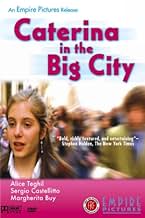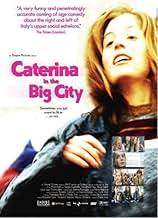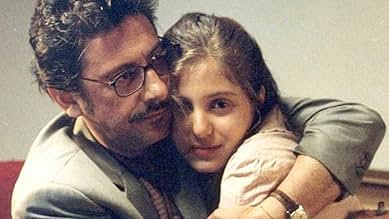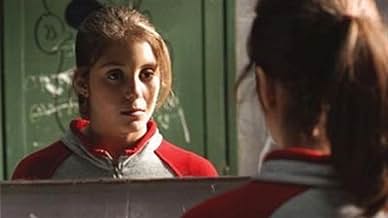CALIFICACIÓN DE IMDb
6.8/10
3.3 k
TU CALIFICACIÓN
Agrega una trama en tu idiomaCaterina, forced to leave her small town at the age of thirteen, faces the complications of living in the big metropoly of Rome.Caterina, forced to leave her small town at the age of thirteen, faces the complications of living in the big metropoly of Rome.Caterina, forced to leave her small town at the age of thirteen, faces the complications of living in the big metropoly of Rome.
- Dirección
- Guionistas
- Elenco
- Premios
- 7 premios ganados y 9 nominaciones en total
Zach Wallen
- Edward
- (as Zach -James Smith- Wallen)
Margerita Mazzola
- Martina
- (as Margherita Mazzola)
Martina Tasquetta
- Alessia
- (as Martina Taschetta)
Giulia Gorietti
- Giada
- (as Giulia Elettra Gorietti)
- Dirección
- Guionistas
- Todo el elenco y el equipo
- Producción, taquilla y más en IMDbPro
Opiniones destacadas
10Andy-296
This excellent Italian comedy is very similar in plot to Mean Girls (who came out in about the same time). The difference is that this is a much more politicized film. Caterina is a shy teenager from a small town in Italy, who moves to Rome with her long-suffering mother and her teacher father, when he is assigned to a new job there. In her new school, she has to choose to what clique to belong: the children of the progressive intellectuals or the children of the rich industrialists. The left or the right. What this film says is that these people are not terribly different between themselves. They both hold a degree of fame and power in Italian society, and look down upon those who don't. The outstanding performance in the movie is that of Caterina's father, the teacher Giancarlo (Sergio Castellito), a hothead angry that others have gotten all the breaks in life, who rants against the rich and privileged but who would sell his soul in a second in order to join the establishment. He is a familiar type of malcontent in real life but one who is seldom shown in the movies. There is a silly subplot of Caterina falling in love with an Australian boy (What they did that for? To reach an international market?), but all in all, this is one of the best Italian movies of the last years.
One of the best movie I've seen recently. An exciting coming of age, an exhilarating comedy, a deep and painful portrait of our society at the present moment."Caterina Va in Città" has outrageously funny scenes starting with Giancarlo's biting farewell to his despised small-town students. But it's a very dark sense of humor. The film is really about personalities, especially his. Imagine a standard coming-of- age movie about a smart, unusual kid learning that it's okay to be an individual, different from the rest. Giancarlo is that kid, only he's 40-something and he hasn't had that final scene where everything turns out okay. Angry that others have gotten all the breaks in life, he righteously criticizes the establishment, big money, the old boys' network, and yet envies them at the same time. Back in Rome, he has a chance to mingle with exactly the class of people he inwardly resents, and every chance he gets to make a mark among them turns to embarrassment.
Played with great flair by Sergio Castellitto (the insouciant chef from "Mostly Martha"), Giancarlo is an enormously sympathetic but uncomfortable character, and his contradictions have a ripple effect on everyone in his orbit. His wife Agata (Margherita Buy) lives in a shell rather than get in the way of her grandiose husband. Caterina (Alice Teghil) is thrust uneasily into a social scene she's thoroughly unprepared for, made even more out of place by her dad's instructions. She doesn't seem to have inherited his low self-esteem, but this new life flies way over her head most of the time. It's a complex portrait of a family's struggle, set amid the tumult of big-city society and class consciousness. "Caterina" is a very rewarding movie.
Played with great flair by Sergio Castellitto (the insouciant chef from "Mostly Martha"), Giancarlo is an enormously sympathetic but uncomfortable character, and his contradictions have a ripple effect on everyone in his orbit. His wife Agata (Margherita Buy) lives in a shell rather than get in the way of her grandiose husband. Caterina (Alice Teghil) is thrust uneasily into a social scene she's thoroughly unprepared for, made even more out of place by her dad's instructions. She doesn't seem to have inherited his low self-esteem, but this new life flies way over her head most of the time. It's a complex portrait of a family's struggle, set amid the tumult of big-city society and class consciousness. "Caterina" is a very rewarding movie.
"Caterina va in città" seems like your typical teen film. It somehow reminds me of "Thirteen", but it goes a little deeper than the average American teen film.
In American teen films the parents are normally reduced to simple shadows that serve more as a background for their sons and daughters' lives - they are either of the preaching-repressive sort, or the tolerant, ever-forgiving parents, that eventually through love will help their children to the way of redemption.
Not so, "Caterina va in città". In this film, not just Caterina ( Alice Teghil) but her parents as well are portrayed as three-dimensional human beings and this makes the film more interesting.
Caterina and her parents move from a small Italian town to Rome. And there Caterina's life will be shaken. She goes to high school and meets new friends - many new things happen in her life. She feels uprooted from her old self, and doesn't know anymore who she really is.
One can say that "Caterina va in città" is a coming of age film - it portrays her search for her place in the world - many American teen films tell the same story. But what differentiates this film from its American counterparts is the attention it gives to the parents. The father Giancarlo (Sergio Castellito) is a deeply disturbed personality. He thinks the world revolves around him and there's a conspiracy of important segments of society whose main aim is preventing him from succeeding in life. He is an egoist that treats his wife as a dumb servant and his daughter as a beautiful puppy. But no, he's not a "bad" man - in his own distorted way he loves his wife and his daughter. Sergio Castellito gives us a stellar interpretation as the problematic father, underlining his pathetic and quixotic traits. Agata (Margherita Buy), is his ever-enduring wife - she has a deeper layer than it may appear at first glance. And there's Caterina living with them, seeing them with her innocent eyes.
The other characters in the film are what one could call walking clichés. Nothing that has not been shown before in American teen movies. Politics shows its colors in the film, but in a very superficial way. It's not really essential for the film's story - left and right could have been easily substituted for rival football teams.
The ending (difficult to imagine in American films) will come as a surprise and have a liberating effect on the viewer. All in all, "Caterina va in città" is a good teen film thats stands a bit above the usual film of the genre.
In American teen films the parents are normally reduced to simple shadows that serve more as a background for their sons and daughters' lives - they are either of the preaching-repressive sort, or the tolerant, ever-forgiving parents, that eventually through love will help their children to the way of redemption.
Not so, "Caterina va in città". In this film, not just Caterina ( Alice Teghil) but her parents as well are portrayed as three-dimensional human beings and this makes the film more interesting.
Caterina and her parents move from a small Italian town to Rome. And there Caterina's life will be shaken. She goes to high school and meets new friends - many new things happen in her life. She feels uprooted from her old self, and doesn't know anymore who she really is.
One can say that "Caterina va in città" is a coming of age film - it portrays her search for her place in the world - many American teen films tell the same story. But what differentiates this film from its American counterparts is the attention it gives to the parents. The father Giancarlo (Sergio Castellito) is a deeply disturbed personality. He thinks the world revolves around him and there's a conspiracy of important segments of society whose main aim is preventing him from succeeding in life. He is an egoist that treats his wife as a dumb servant and his daughter as a beautiful puppy. But no, he's not a "bad" man - in his own distorted way he loves his wife and his daughter. Sergio Castellito gives us a stellar interpretation as the problematic father, underlining his pathetic and quixotic traits. Agata (Margherita Buy), is his ever-enduring wife - she has a deeper layer than it may appear at first glance. And there's Caterina living with them, seeing them with her innocent eyes.
The other characters in the film are what one could call walking clichés. Nothing that has not been shown before in American teen movies. Politics shows its colors in the film, but in a very superficial way. It's not really essential for the film's story - left and right could have been easily substituted for rival football teams.
The ending (difficult to imagine in American films) will come as a surprise and have a liberating effect on the viewer. All in all, "Caterina va in città" is a good teen film thats stands a bit above the usual film of the genre.
I am a student in Australia, in year 9, 15 years old, studying Italian at LaSalle Catholic College Bankstown. I viewed this film as an excursion 3 days ago, and I loved it. I feel for Caterina because I guess I am a little naive in a way. She didn't realize that people were using her, she didn't realize that Margherita liked her in a different, more romantic way, she didn't know about a lot that went on in Rome. It was a very nice, dramatic and funny storyline, and i suppose it appeals to a large audience. I rated it 9/10. I took off 1 mark because I feel not enough was shown of Edward, the guy she loved, the guy from "down under", the guy who most Australians can identify with. He played a prime role in my eyes because he brought her life back on track when she had run away. A little more could have also been shown of Fabietto and Agata's relationship. This film was an excellent representation of the comparison between the posh side of Italy and the grateful and appreciative side of Italy
I wish I could say that this was a great film because there really were a lot of things that one could like about it.
As it turns out, however, it is a good, but flawed film. I will give this film a recommendation, I think it is worth seeing.
The film made a number of incredible social statements. It really cuts to the quick about the nature of society, the people who can manipulate the system on both sides are in collusion with each other to keep their privilege. The people who are on the outside find themselves on the outside, looking in. They can be taken under someone's wing but they are never really more then a pet, the Jimmy Olsen to someone's Superman.
The film had spectacular acting, particularly from the lead.
So what then keeps the film from being great? One of the biggest problems comes from the episodic and picaresque structure of the film. It has the kind of structure that is more interesting because of its discontinuity then because of its continuity. And while it makes for a lot of interesting discussions, this could turn a lot of people off, probably even more then the subtitles.
Honestly, the problem is that it begins with Caterina being pulled in many directions and it allows us to see facets of her through these different social lenses. The trouble is that we never get a baseline reading on her in the beginning before she moves to Rome. This is done very well but we never get the impression of her as anything more then a tablet that the ideologies of others are being written on, even at the end of the film when she supposedly finds herself. I won't give a spoiler as to how but the ending that someone else commented was her in her element is really just another case of this.
You know what, I've changed my mind. This is a wonderful film to watch. Its a spectacular way to look at what life is really like when you are outside the powerful and privileged circles of society and you can only be influenced by the ideologies of others but you really lack any voice of your own.
Watch this along with Welcome to the Dollhouse and see what life was like for the rest of us. Let this film show you the social cliques, collusion and ideology and let Solondz show you the sheer cruelty of a society that, as J. G. Ballard said, normalized psychopathy. And see it for what it really is, not some sugarcoated network television version (I think you guys know what very popular television series I'm talking about).
As it turns out, however, it is a good, but flawed film. I will give this film a recommendation, I think it is worth seeing.
The film made a number of incredible social statements. It really cuts to the quick about the nature of society, the people who can manipulate the system on both sides are in collusion with each other to keep their privilege. The people who are on the outside find themselves on the outside, looking in. They can be taken under someone's wing but they are never really more then a pet, the Jimmy Olsen to someone's Superman.
The film had spectacular acting, particularly from the lead.
So what then keeps the film from being great? One of the biggest problems comes from the episodic and picaresque structure of the film. It has the kind of structure that is more interesting because of its discontinuity then because of its continuity. And while it makes for a lot of interesting discussions, this could turn a lot of people off, probably even more then the subtitles.
Honestly, the problem is that it begins with Caterina being pulled in many directions and it allows us to see facets of her through these different social lenses. The trouble is that we never get a baseline reading on her in the beginning before she moves to Rome. This is done very well but we never get the impression of her as anything more then a tablet that the ideologies of others are being written on, even at the end of the film when she supposedly finds herself. I won't give a spoiler as to how but the ending that someone else commented was her in her element is really just another case of this.
You know what, I've changed my mind. This is a wonderful film to watch. Its a spectacular way to look at what life is really like when you are outside the powerful and privileged circles of society and you can only be influenced by the ideologies of others but you really lack any voice of your own.
Watch this along with Welcome to the Dollhouse and see what life was like for the rest of us. Let this film show you the social cliques, collusion and ideology and let Solondz show you the sheer cruelty of a society that, as J. G. Ballard said, normalized psychopathy. And see it for what it really is, not some sugarcoated network television version (I think you guys know what very popular television series I'm talking about).
¿Sabías que…?
- TriviaSara Pallini's debut.
- ErroresThe story begins in 2003, but the dates do not match up with the days of the week for that year.
- ConexionesReferences Los hermanos caradura (1980)
- Bandas sonorasInno ufficiale dei giovani fascisti
Music by Giuseppe Blanc and lyrics by Vittorio E. Bravetta
Sung at the wedding reception
Selecciones populares
Inicia sesión para calificar y agrega a la lista de videos para obtener recomendaciones personalizadas
- How long is Caterina in the Big City?Con tecnología de Alexa
Detalles
Taquilla
- Total en EE. UU. y Canadá
- USD 296,464
- Fin de semana de estreno en EE. UU. y Canadá
- USD 9,352
- 5 jun 2005
- Total a nivel mundial
- USD 4,407,426
- Tiempo de ejecución
- 1h 47min(107 min)
- Color
- Mezcla de sonido
- Relación de aspecto
- 2.35 : 1
Contribuir a esta página
Sugiere una edición o agrega el contenido que falta






















